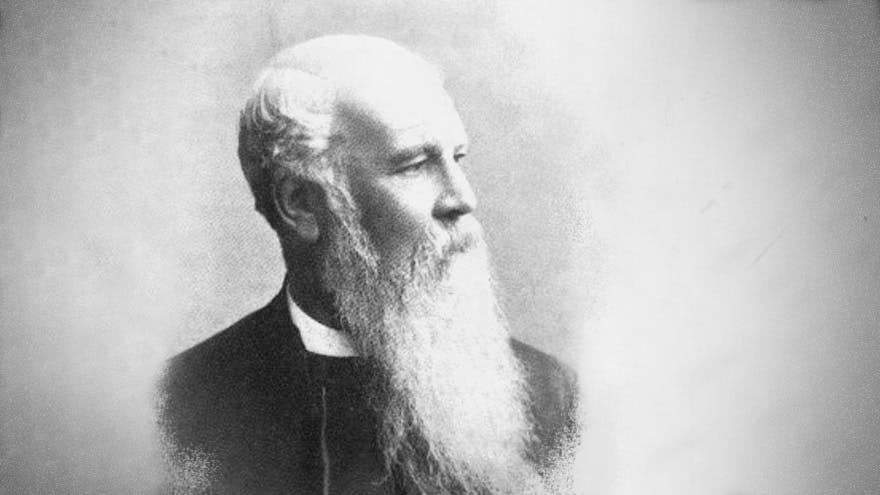
1 - JC Ryle
John Charles Ryle, better known as JC Ryle, was born in Macclesfield, Cheshire in England on the 10th of May 1816. He grew up in a wealthy home; his father’s family owned a bank. This enabled him to have top-class education at Eton College and the University of Oxford. He excelled academically and was an excellent cricketer. He left university with the intention of standing for parliament, but this ambition was shattered with his father’s bankruptcy.
His family, like him, were merely nominal Christians. He was gloriously converted at the age of 21. He simply heard these words from the Bible at a church service: “8For you are saved by grace through faith, and this is not from yourselves; it is God’s gift—9not from works, so that no one can boast” (Ephesians 2:8-9). So never ever underestimate the power of God’s word to convert a sinner!
He recalls this life changing moment saying, “Nothing I can remember this day appeared to me so clear and distinct as my own sinfulness, Christ’s preciousness, the value of the Bible, the absolute necessity of coming out of this world, the need to be born again…All these things seemed to flash upon me like a sunbeam, in the winter of 1837…Before that time, I was dead in sins, and on the high road to hell. From that time, I had become alive, and have had a hope of heaven, and nothing in my mind can account for it but the free sovereign grace of God.” He married three times; the first time on 29th October 1845. Sadly, his first two wives died at a young age. He had a daughter and 3 sons.
He entered the pastorate with the Church of England as an Anglican and was ordained. He served in rural country churches for most of his ministry among the working-class people. His preaching was understood clearly by ordinary people, and he had the heart of an evangelist, calling people to faith in Christ. By God’s grace, the churches he served grew by a good few hundred as he preached God’s word and pastored the believers faithfully. JC Ryle had a reputation for being a powerful preacher, diligent pastor, and a popular author. He was thoroughly committed to being evangelical in doctrine and was soon recognised as a leader. He became the first Bishop of Liverpool in 1880 at the age of 64 and remained there till 1900. He reluctantly retired in March 1900 due to ill health and died just 4 months later on the 10th of June 1900.
He leaves a wonderful legacy behind of his writings. He wrote books that are still in print. Probably the best known is his book “Holiness, its nature, hindrances, difficulties and roots” as well as “Old paths” showing he was a committed evangelical, holding to the old paths of faith just as he’d received them. He also penned more than 200 tracts to win sinners to Christ; well over 12 million copies of these were sold. Further, he wrote classic commentaries on all 4 gospels, entitled “Expository thoughts on Matthew, Mark, Luke and John”.
In a glowing tribute to J.C. Ryle a few days after his death, it was said that “He was great through the abounding grace of God. He was great in stature; great in mental power; great in spirituality; great as a preacher and expositor of God’s most holy Word; great in hospitality; great as a writer of Gospel tracts; great as a Bishop of the Reformed Evangelical Protestant Church in England, of which he was a noble defender; great as first Bishop of Liverpool…perhaps few men in the nineteenth century did as much for God, for truth, and for righteousness, among the English speaking race, and in the world, as our late Bishop.”
May his life and legacy inspire us to hear God’s word in all its truth so that many sinners are soundly converted and those who’ve believed live holy lives.
2 - John Bunyan
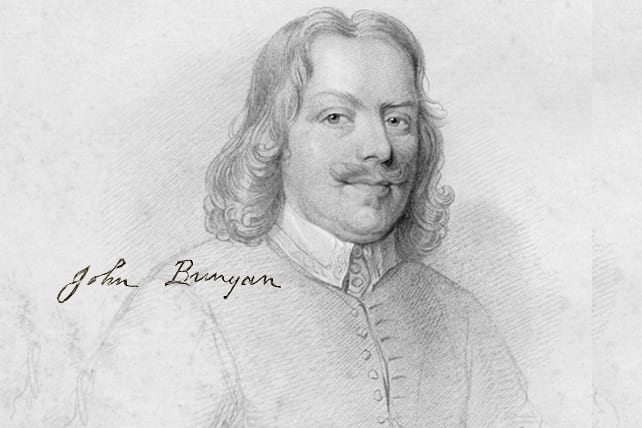
Some people leave a wonderful legacy after their death. And this so true of John Bunyan. He wrote a classic Christian book that’s sold 250 million copies. Yet it’s so bizarre, but true, that he lived at a time when public preaching was considered a crime.
Meet John Bunyan. He was born in Elstow near Bedford, England in 1628. He grew up in turbulent times. When he was just 14 years old fighting broke out in the Great Rebellion, a civil war. At the age of 16 he was conscripted into the army, though he never faced combat in war. After three years he was discharged to pursue his trade as a tinker, as taught by his father. A tinker made and mended pots, pans and utensils. In his early years John rebelled against God and “had but few equals, both for cursing, swearing, lying, and blaspheming the holy name of God”. Then his life changed radically.
Fortunately John married a God-fearing woman in 1648 when he was 20 years old. And while she was just as poor as he was, she did own a Bible and two Christian books. And due to her influence in his life, John felt increasingly convicted of his sin and tried to reform his ways. A group of older women were instrumental in his conversion by their public discussion, talking about the things of God. They then introduced him to their pastor in Bedford, John Gifford, who helped John to turn away from his life of sin, to allay his doubts and fears, and to believe in Jesus. It wasn’t long after this that John began to preach. He had the ability to touch his hearer’s hearts when he preached.
John was married for ten years with four children but tragically his wife died. He then remarried Elizabeth who proved to be a great comfort to him, especially during the time of his imprisonment. At the age of 32 John was imprisoned for preaching without official permission from the king and consequently jailed for more than 12 years in the Bedford County Gaol. To secure his freedom, there was just one condition: he had to agree not to preach publicly. To this he said, “If I was out of prison today, I would preach the gospel again tomorrow by the help of God”. Ironically, he was unofficially permitted to preach in prison, for many were there just because of their religious convictions.
His imprisonment gave him time to write. Now at that time, the poor never had much education, but John could read and write while many others were illiterate. He used this God-given gift to write books. He penned, Grace Abounding to the Chief of Sinners, wherein he told his conversion story. However, his most well-known book was Pilgrim’s Progress, an allegory, but it wasn’t completed when he was released from prison.
After his release, he served as a Baptist pastor in Bedford. He was a gifted preacher and writer. However his freedom wasn’t long lived as, after 6 years, he was arrested again and imprisoned for the same offence. Mercifully, his sentence lasted just six months and during this time he completed writing Pilgrim’s Progress. He wrote powerfully in simple language to be understood by ordinary people. It was published in 1678 and was a bestseller, to John’s amazement. It is regarded as one of the most significant Christian writings in English literature and it communicates timeless Bible truths. Pilgrim’s Progress chronicles the story of Christian’s journey from the City of Destruction to the Celestial City, detailing how he, weighed down by his great burden of sin, is liberated of his unbearable burden, and the subsequent struggles he faced en-route to his heavenly destination. This is a classic Christian book that every follower of Jesus must read.
In August 1688 after embarking on a pastoral call in the pouring rain, he fell ill with pneumonia and died at the age of 60. Inspired by him, let’s journey onwards to our heavenly home.
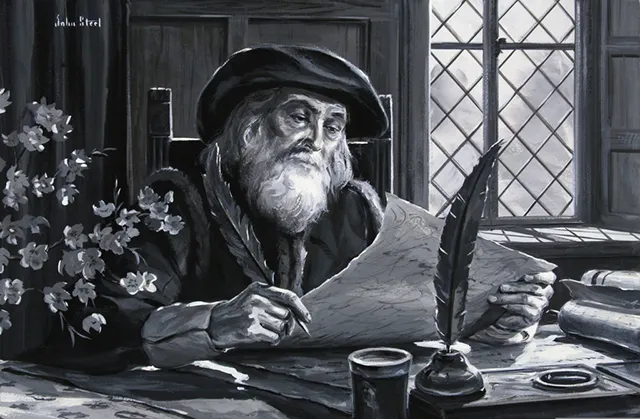
3 - John Wycliffe
When you look at your bookshelf, you’ve probably got many copies of the Bible stacked there or lying around elsewhere in your home. So it’s really hard to believe that the church would prevent ordinary people from having a Bible they can read in their own language; yet that’s precisely what happened. Then on to the scene an Englishman named John Wycliffe arrived who’s credited with translating the Bible into English so that anyone can read it. For so long the power and authority to read and interpret the Bible was held in the hands of the church’s hierarchy. Wycliffe’s lasting legacy was his role in translating the Bible into the common language. Yet while he’s credited with doing it, it’s very likely that two of his followers, Nicolas Hereford and John Purvey, really did it.
No one knows exactly when John Wycliffe was born in Yorkshire, England, but it was somewhere around 1324. Little detail of his early years is known. Wycliffe attended Oxford University, earning a doctorate in divinity and became an Oxford professor. However, Wycliffe objected to the church’s abuses and challenged the hierarchy. He also claimed that the Scriptures were God’s sole supreme authority. He survived the Black Death pandemic of 1347-1352 but the immense suffering caused by the plague glaringly exposed the church’s inability to deal with this extreme suffering.
Wycliffe believed that the Bible needed to be in the hands of everyone. So his desire was to make it available for common use in the language of the people. He believed that the ordinary person should be able to read the Scriptures in their own language. And then when the Bible became available, there was an enthusiastic response to the English translation. Although most people in England could not read English, nevertheless, they could understand it when it was read to them. So the Bible translated into English was a direct challenge to the church’s authority. The church no longer controlled how to understand the Scriptures so these translations were burned. Remember that the printing press had not yet been invented so each copy of the Bible was handwritten. Surprisingly, over 200 copies have survived, showing how popular these English translation Bibles must have been. And it’s no surprise why a Bible translating organization named itself after him. The Wycliffe Bible translators have translated the complete Bible for 698 languages, 1,548 languages have a complete New Testament, and 1,138 have some translated portions of the Bible in their language.
Yet, bizarrely, Wycliffe was accused of heresy and summonsed to London to appear before the Archbishop of Canterbury to explain his beliefs. The power of Wycliffe’s arguments came from his understanding of the Scriptures. He said, “I am ready to defend my convictions even unto death…I have followed the Sacred Scriptures”. He was known for his skill as a writer, orator, and preacher. He longed to restore the church to what it should be in stark contrast to what it had become.
In 1374 he was appointed Rector of Lutterworth where he lived till he died in 1384. After his death, some 40 years later, at the Council of Constance in 1415, Wycliffe was eventually condemned as a heretic. His bones were exhumed, burned, and scattered into the River Swift. But instead of quelling an interest in the Bible, his influence continued. Some said that as his ashes were dispersed into the river, it then ran further into the sea to distant shores.
John Wycliffe was a theologian and Bible translator. He famously said “Trust wholly in Christ; rely altogether on his sufferings; beware of seeking to be justified in any other way than by his righteousness.” His life and example impacted many people around the world. His followers, called the Lollards, continued the work he began despite persecution. Wycliffe is frequently referred to as “the morning star of the Reformation” that would dawn a few hundred years later.
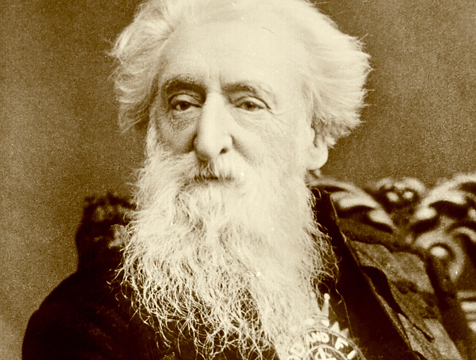
4 - William Booth
William Booth was born in Nottingham, England on the 10th April 1829. William’s life took an unexpected turn at age 13 when his father lost all his money and died a year later. To help support his family, William found a job as an assistant to a pawnbroker, a moneylender. He was converted at the young age of 15. He offered his life to serve God saying, “God shall have all there is of William Booth”. He started preaching in the streets to those who weren’t welcome in the church. He had a real heart for the poor. In 1849 William went to London to find work but didn’t enjoy being a pawnbroker again. A sponsor supported him for three months, impressed with his preaching. Later he became a full-time Methodist preacher.
William met Catherine Mumford, an intelligent and determined woman who knew her Bible. In 1855 they were married and had eight children. His desire was to preach wherever he could. He eventually left preaching in churches to preach to the poor and destitute in London’s East End. He was often assaulted or pelted with stones or rotten foods. While he had no official theological training, he believed firmly that everyone needed to accept Christ personally as their Saviour. While many accepted Christ, others who unashamedly lived sinful lives in the new run-down industrial towns refused to turn to Christ. He especially longed to reach the drunkards, criminals and prostitutes to offer them God’s salvation as they were ignorant of God’s salvation offer in Christ.
In 1865 while back in London, William encountered “The Christian Mission” in East London, England, preaching outside the pub, The Blind Beggar. He was then invited to lead this mission. This was the beginning of The Salvation Army. By 1878 the Christian Mission had grown and morphed to become the Salvation Army. He was affectionately called the General as he was leading an army for Jesus. While William’s son, Bramwell, was writing a letter to explain their mission, they decided to change the name to The Salvation Army. Its members were soldiers for Jesus in God’s army. They wore uniforms and while they marched to church, accompanied by the brass band, they sang.
William recruited reformed sinners as gospel workers. His famous quote: “Most Christians would like to send their recruits to Bible College for five years. I would like to send them to hell for five minutes. That would do more than anything else to prepare them for a lifetime of compassionate ministry.” While his aim was to make God’s salvation in Christ known, he realized that people were in desperate need, so he established food kitchens and housing to show the love of Christ practically. He expressed his mission using three simple words: “Soup, Soap, Salvation”. He said, “You cannot warm the hearts of people with God’s love if they have an empty stomach and cold feet.” The motto of The Salvation Army was “blood and fire”: “the blood of Jesus and the fire of the Holy Spirit”. They frequently faced considerable opposition as pub owners were now losing income. Sadly, their church members, including children, were attacked in 1882 and some of their property was damaged and destroyed. But this didn’t deter William from their mission. The tide eventually turned, and they were protected by the law.
William wrote a book the year his wife died entitled, “In Darkest England and the Way Out” which sold more than 20000 copies. In just nine short years, The Salvation Army had served 27 million cheap meals, found 18000 missing people, housed 11 million people and found 9000 jobs. Unintentionally, The Salvation Army spread around the world, and is now serving in 125 countries worldwide. At the age of 83 William addressed 7000 members at the Royal Albert Hall in London and died three months later. More than 150 000 people filed past his coffin in the Clapham Congress Hall and 40 000, including Queen Mary, attended his funeral. What a legacy that still marches on!
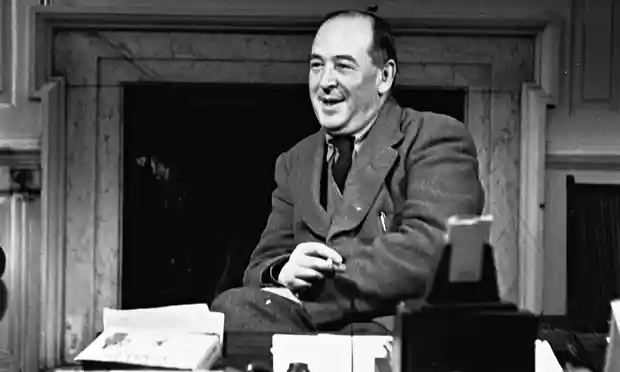
5 - CS Lewis
Best known for his “Chronicles of Narnia” fantasy series, C.S. Lewis was a prolific Irish writer and scholar. He taught at Oxford University and became a renowned Christian apologist.
Clive Staples Lewis was born in Belfast, Ireland on 29th November 1898. Known to his family as Jack, he and his older brother Warren created an imaginary land of Boxen with talking animals. During World War I, he served with the British army but was sent home after being wounded by shrapnel.
CS Lewis was brought up in the Church of Ireland, but in his teen years lost his faith; for he was turned off by boring church services and the problem of evil in the world. He became a Christian in 1931 describing himself as a reluctant and unwilling convert. In his book, “Surprised by Joy” he writes that he came to Christianity “kicking, struggling, resentful, and darting his eyes in every direction for a chance to escape.” However, he “admitted that God was God, and knelt and prayed: perhaps, that night, the most dejected and reluctant convert in all England.” He was part of a group known as The Inklings, writers and intellectuals, that included J.R.R. Tolkien who was instrumental in him again embracing Christianity. One of his famous quotes is, “I believe in Christianity as I believe that the sun has risen, not only because I see it but because by it I see everything else.” Profound!
CS Lewis graduated from Oxford University in literature and classic philosophy, and in 1925 he was awarded a fellowship teaching position at a college connected to the university where he worked for nearly thirty years till 1954. He was a respected Christian apologist using his intellect with logic and philosophy. During World War II, he gave popular radio broadcasts about Christianity through which many were won to Christ; these talks were compiled into his book “Mere Christianity”.
CS Lewis was a prolific author. He released a science fiction work, “Out of the Silent Planet”, as the first of a space trilogy which subtlely dealt with concepts of sin and desire. His Christian apologetic books included “The Great Divorce”, “Miracles”, “The problem of pain” and his fictional novel “The Screwtape Letters” as well as his autobiography, “Surprised by Joy: The Shape of My Early Life”.
However, he’s probably best known for his fantasy children’s series, “The Chronicles of Narnia”, made up of seven books. “The Lion, The Witch and the Wardrobe” was published first in 1950. It’s a story about four siblings who, during wartime, walk through a wardrobe to enter the magical world of Narnia. Narnia is a land with mythical creatures and talking animals, weaving biblical truths throughout the story. Aslan is the lion who rules Narnia; he’s the Jesus figure. Some of these books have been produced as movies like “The Lion, The Witch and the Wardrobe” in 2005, “Prince Caspian” in 2008 and “The Voyage of the Dawn Treader” in 2010.
In 1956 he married Joy Gresham. The book “Shadowlands” tells the story of their marriage; it was also produced as a movie, directed by Richard Attenborough and starred Anthony Hopkins as CS Lewis. He enjoyed a happy marriage, but sadly Joy died of cancer in 1960 at the age of 45. He grieved deeply for his wife and shared his thoughts in the book “A Grief Observed”, using a pseudonym, N. W. Clerk. In 1963, he resigned from his Cambridge position after experiencing heart trouble. He died on 22nd November 1963 in Headington, Oxford at the age of 64.
CS Lewis will be remembered as a gifted Christian author who used fantasy to tell stories, but much more than that, he’s left a legacy of truth in some of the best arguments of Christian thought, helping us focus on Christ and giving us invaluable insights into the Bible and life.